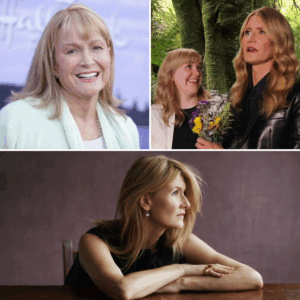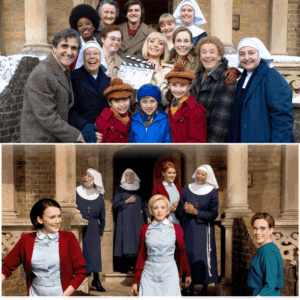HBO Max’s The Staircase (2022), an eight-episode miniseries created by Antonio Campos, transforms the infamous Michael Peterson case into a gripping blend of courtroom drama, family intrigue, and media frenzy. Starring Colin Firth as Michael Peterson and Toni Collette as his wife Kathleen, the series revisits the 2001 death of Kathleen Peterson, found lifeless at the bottom of a staircase in their Durham, North Carolina home. Was it a tragic accident, as Michael claims, or a brutal murder? The question, left unresolved in the real-life case, fuels a narrative packed with twists, secrets, and moral ambiguity. Drawing on the 2004 documentary by Jean-Xavier de Lestrade, also titled The Staircase and available on Netflix, this dramatization delves into the complexities of the Peterson family, the judicial system, and the media circus that captivated the world. This article explores the series’ narrative, performances, themes, and its place within the true-crime genre, while examining its chilling impact and critical reception.
The Case That Shocked the World
On December 9, 2001, Michael Peterson, a novelist and former mayoral candidate, called 911 to report that his wife, Kathleen, was lying unconscious at the bottom of their home’s staircase, surrounded by a pool of blood. Initially, he claimed she had fallen after drinking wine and possibly taking Valium, a tragic accident exacerbated by her attempt to stand, slipping in her own blood. However, the sheer volume of blood and the severity of her injuries—seven deep lacerations to her scalp—prompted Durham police to treat the scene as a homicide. Michael, then 58, was charged with first-degree murder two months later, sparking a 16-year legal saga that became a media sensation.
The case’s complexity stemmed from its contradictions. Michael insisted he was by the pool when Kathleen fell, unable to hear her cries, a claim supported by the defense’s reenactment but questioned by prosecutors. The discovery of 2,000 explicit images of men and emails with a male escort on Michael’s computer fueled speculation that Kathleen’s discovery of his bisexuality sparked a fatal argument. Further complicating matters was the 1985 death of Elizabeth Ratliff, a family friend in Germany, also found at the bottom of a staircase with head injuries. Initially ruled an accident due to a cerebral hemorrhage, her exhumed body was later deemed a homicide, casting suspicion on Michael, who was the last to see her alive and later adopted her daughters, Margaret and Martha.
The trial, beginning in July 2003, was a spectacle of conflicting narratives. The prosecution, led by Jim Hardin and Freda Black, argued Michael bludgeoned Kathleen with a blow poke, a fireplace tool gifted by her sister Candace, which was missing until the defense produced it, undamaged, from the garage. Blood spatter analyst Duane Deaver’s testimony, claiming the patterns indicated a beating, swayed the jury, leading to Michael’s conviction and life sentence without parole in October 2003. Yet, in 2011, Deaver’s credibility collapsed after an audit revealed he falsified evidence in 34 cases, prompting a new trial. In 2017, Michael entered an Alford plea to voluntary manslaughter, acknowledging the prosecution’s evidence while maintaining his innocence, and was freed after serving eight years.
The Dramatization: A Fresh Lens on a Familiar Story
HBO Max’s The Staircase builds on de Lestrade’s documentary, which chronicled the trial from 2001 to 2017, but takes creative liberties to explore the human drama behind the headlines. Directed by Campos and co-showrunner Maggie Cohn, the series employs a non-linear narrative, jumping between the night of Kathleen’s death, trial preparations, and post-trial developments. This structure, while occasionally disorienting, as noted by IMDb reviewers, allows viewers to see Kathleen (Collette) as more than a victim, depicting her as a vibrant telecom executive navigating work stress and family life before her death.
The series introduces fictionalized elements, such as reimagined family dynamics and speculative scenarios of Kathleen’s death—an accident, a murder, or even an owl attack, a theory popularized in 2009 by neighbor Larry Pollard, who cited pine needles and feathers found on Kathleen’s body as evidence of a barred owl’s talons causing her scalp wounds. These recreations, particularly in episodes like “Red in Tooth and Claw,” add a meta-layer, inviting viewers to question what they believe, much like the documentary’s Rorschach-test quality. Vox describes the series as a “compilation of Rorschach tests,” where interpretations of guilt or innocence depend on the viewer’s perspective.
Performances: Firth and Collette Elevate the Drama
Colin Firth delivers a nuanced performance as Michael Peterson, capturing his charisma, arrogance, and vulnerability. His portrayal balances Michael’s public persona—a charming writer and political hopeful—with his private contradictions, including his hidden bisexuality and tendency to withhold damaging truths. Vulture notes that Firth’s Michael hints at “some amount of guilt,” whether for Kathleen’s death or his manipulative family dynamics, making him both compelling and infuriating. Toni Collette shines as Kathleen, bringing depth to a character often sidelined in the documentary. Her scenes, from joyful family moments to tense confrontations, humanize Kathleen, making her loss palpable. Los Angeles Times praises Collette’s ability to portray Kathleen as “conceivably the victim of a murder or an accident,” a Schrödinger’s cat of true crime.
The ensemble cast, including Michael Stuhlbarg as defense attorney David Rudolf, Rosemarie DeWitt as Candace, and Sophie Turner and Odessa Young as adopted daughters Margaret and Martha, adds emotional weight. Stuhlbarg’s Rudolf is a pragmatic yet empathetic figure, grappling with the case’s moral ambiguities, while DeWitt’s Candace embodies raw grief and conviction in Michael’s guilt. The younger cast, including Patrick Schwarzenegger as Todd Peterson, portrays the fractured family dynamics, torn between loyalty to Michael and doubts about his story.
Themes: Family Secrets, Media Obsession, and Justice’s Flaws
The Staircase delves into themes of family secrets, media obsession, and the fallibility of the justice system. The Peterson family, a blended unit of Michael’s sons (Todd and Clayton), Kathleen’s daughter Caitlin, and adopted daughters Margaret and Martha, unravels under scrutiny. Caitlin’s decision to side with the prosecution, filing a $25 million wrongful death lawsuit, contrasts with the other children’s loyalty to Michael, highlighting the fractures caused by secrets like his bisexuality and the Ratliff case. The series portrays Michael’s attempts to manipulate his children, as seen in Vulture’s analysis, adding a layer of dysfunction to their “happy family” facade.
The media circus surrounding the case is another focal point. The documentary, filmed by de Lestrade from 2002 to 2018, turned the Petersons into a public spectacle, with The Guardian noting their status as “darlings of the social set” before the tragedy. The HBO series critiques this voyeurism, showing how media shaped perceptions of Michael’s guilt, particularly through the prosecution’s focus on his sexuality. Defense attorney Rudolf dismissed the bisexuality as a “non-issue,” arguing that an affair, regardless of gender, doesn’t imply murder, yet the prosecution’s moral outrage, led by Freda Black (Parker Posey), swayed public opinion.
The series also exposes flaws in the justice system, particularly through Duane Deaver’s discredited blood spatter testimony. His exaggerated credentials and falsified evidence, uncovered in a 2010 audit, led to Michael’s new trial, raising questions about forensic reliability. Autostraddle highlights the broader impact of Deaver’s misconduct, affecting over 200 cases, and critiques the dubiousness of bloodstain pattern analysis, a field lacking scientific rigor despite its courtroom weight. The series, like the documentary, portrays a system where politics and bias can overshadow truth, as noted by IMDb reviewers who call it a “broken justice system” documentary.
Critical Reception and Controversies
The Staircase has earned critical acclaim, with a 92% approval rating on Rotten Tomatoes based on 71 reviews, praising Firth’s “terrific performance” and the series’ fresh perspective. However, it faced backlash from the original documentary team, particularly de Lestrade, who felt “betrayed” by the dramatization’s portrayal of his team’s relationship with Michael, including a 13-year romance between editor Sophie Brunet (Juliette Binoche) and Michael. De Lestrade and Rudolf criticized inaccuracies, such as misattributing work and suggesting bias in the documentary’s editing. Michael himself felt “pimped out,” claiming he wasn’t informed about the HBO series.
Audience reactions are mixed. IMDb users appreciate the acting and writing but find the non-linear timeline confusing, with some feeling it disrupts the narrative flow. Fans of the documentary, available on Netflix, note that the HBO series adds little new information, relying on invented drama to fill gaps, as Los Angeles Times points out. The owl theory, given significant attention in episodes like “Red in Tooth and Claw,” fascinates viewers but frustrates those seeking closure, as the case remains unresolved.
Why It Grips Audiences
The Staircase captivates through its chilling ambiguity. The question of Michael’s guilt—bolstered by Firth’s layered performance—keeps viewers guessing, while Collette’s portrayal makes Kathleen’s absence haunting. The series’ exploration of family secrets, from Michael’s hidden affairs to the Ratliff case, creates a Southern Gothic melodrama, as Vox describes, that’s both intimate and sprawling. The media obsession, reflected in the documentary crew’s presence (fictionalized with Binoche’s Brunet), adds a meta-layer, questioning the ethics of true-crime storytelling. The courtroom drama, with its flawed forensics and moral debates, underscores the elusiveness of truth, making The Staircase a compelling study of human complexity.
Conclusion
HBO Max’s The Staircase is a masterful dramatization of a case that continues to baffle and fascinate. Through stellar performances, particularly by Firth and Collette, and a non-linear narrative, it breathes new life into the Michael Peterson saga, exploring the murky intersections of family, justice, and media. While criticized for inaccuracies and a convoluted timeline, the series succeeds in humanizing Kathleen and probing the moral ambiguities of a case without easy answers. For true-crime fans, it’s a must-watch, offering a chilling, thought-provoking journey into a mystery that shocked the world and remains unresolved, leaving viewers to ponder: accident or murder?

